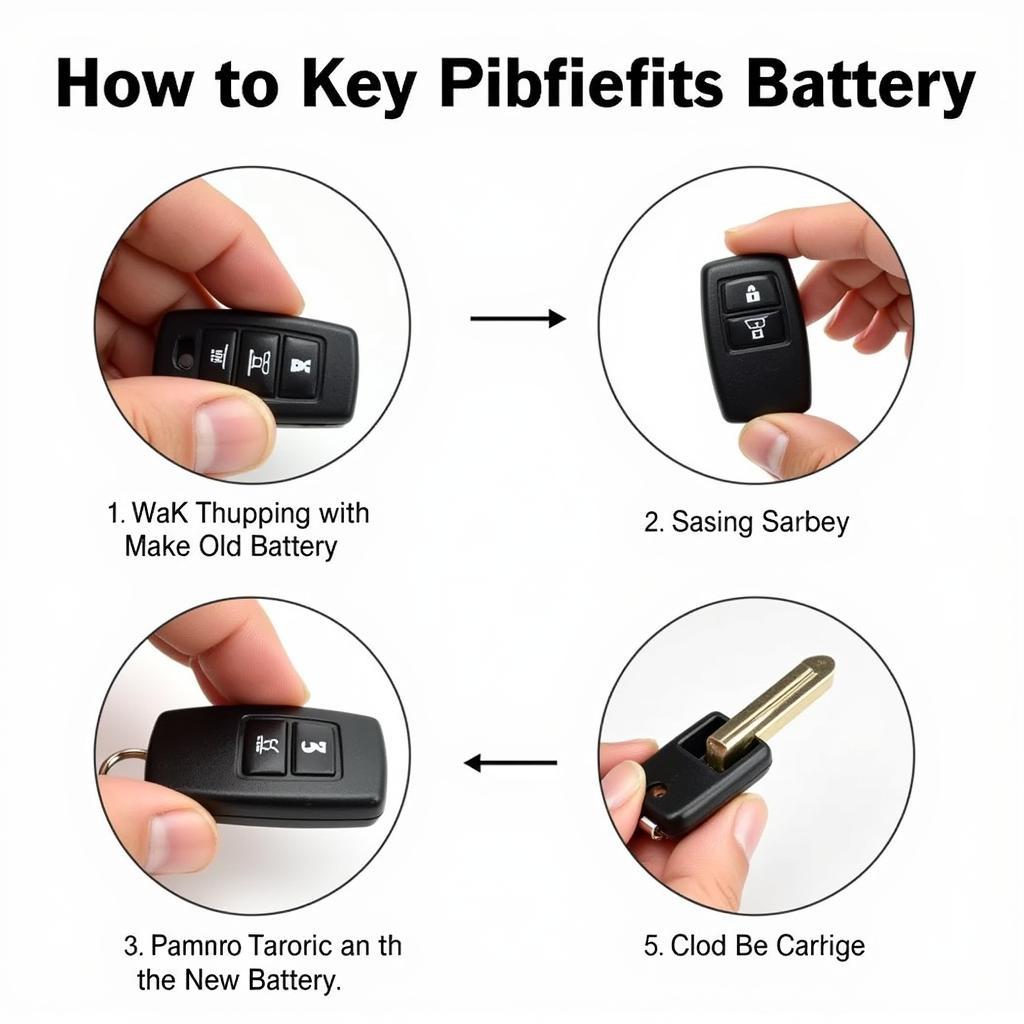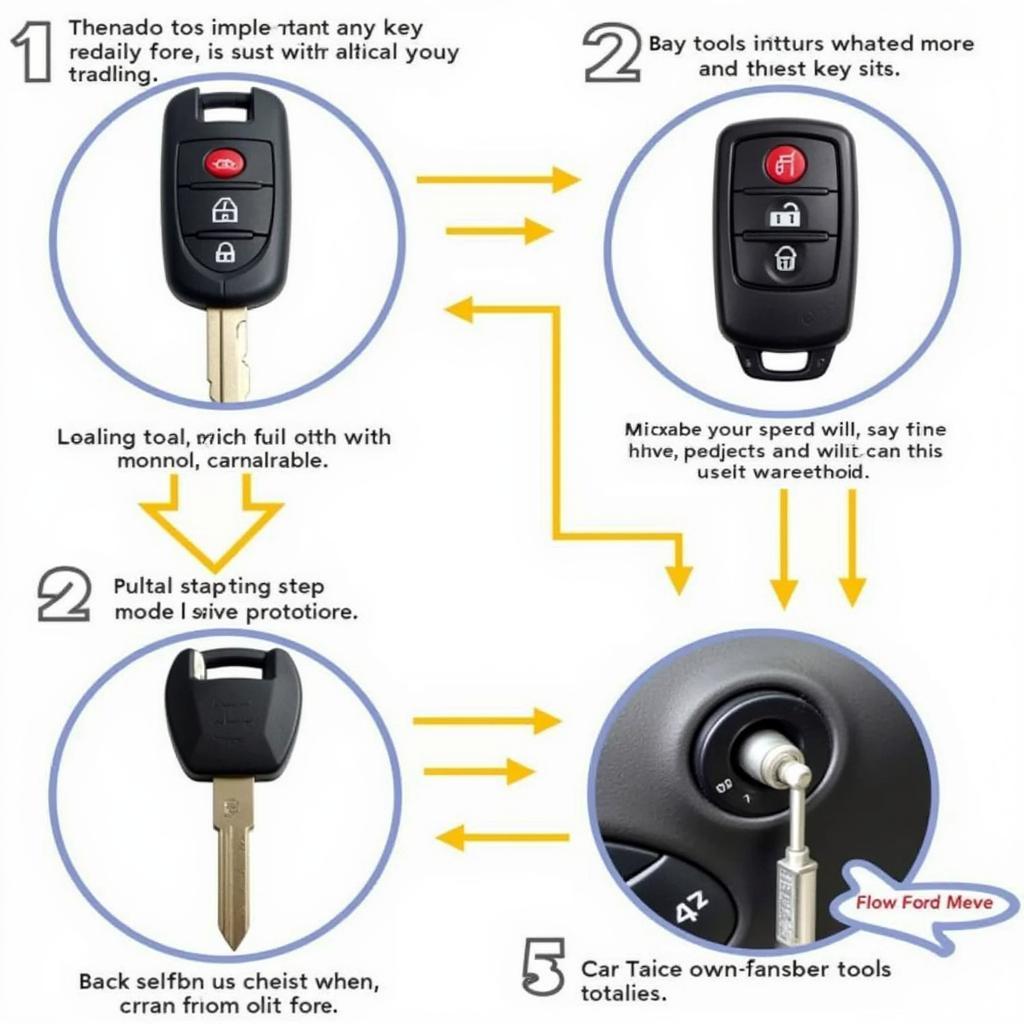Your key fob is supposed to unlock your car and start the engine effortlessly, but what happens when it suddenly stops working? A key fob not starting car is a frustrating situation, but understanding the potential causes and troubleshooting steps can often save you a costly trip to the mechanic. This guide provides expert insights and practical solutions to help you regain control of your vehicle.
Why is My Key Fob Not Starting My Car?
Several reasons can explain why your key fob won’t start your car, ranging from simple battery issues to more complex electronic malfunctions. Identifying the root cause is crucial for effective troubleshooting.
Common Key Fob Problems
- Dead Key Fob Battery: This is the most common culprit. A weak battery can prevent the fob from transmitting the necessary signal to your car’s receiver.
- Weak Car Battery: Surprisingly, a low car battery can also interfere with the key fob’s signal reception. The car’s systems may not have enough power to recognize the fob.
- Key Fob Programming Issues: Sometimes, the key fob may lose its programming, effectively becoming unpaired from your car. This can happen after a battery change or due to electronic interference.
- Faulty Key Fob: Internal damage to the key fob itself, such as a broken circuit or damaged buttons, can render it unusable.
- Car Receiver Problems: The receiver in your car that picks up the key fob’s signal may be malfunctioning, preventing it from starting the engine.
- Immobilizer System Malfunction: Modern cars have immobilizer systems that prevent theft. If this system malfunctions, it can mistakenly prevent your key fob from starting the car.
 Replacing a key fob battery
Replacing a key fob battery
Troubleshooting Your Key Fob
Before rushing to a mechanic, try these troubleshooting steps to identify and possibly fix the issue yourself.
-
Check and Replace the Key Fob Battery: Locate the small battery compartment within your key fob (often requiring a small screwdriver). Replace the battery with a fresh one of the correct type.
-
Try the Spare Key Fob: If you have a spare key fob, try using it to start the car. If the spare fob works, it confirms the problem lies with the original fob.
-
Test the Car Battery: Attempt to start the car using the physical key (if your car has one) or try jump-starting it. If the car starts, the issue might be a weak car battery affecting the key fob’s operation.
-
Check for Key Fob Programming Instructions: Consult your car’s owner’s manual for instructions on how to reprogram the key fob. Some vehicles allow you to do this yourself, while others may require a visit to a dealership or specialized locksmith.
What if None of These Steps Work?
If you’ve exhausted these troubleshooting steps, it’s time to seek professional help. A qualified automotive technician with expertise in car electronics can diagnose the issue accurately using specialized diagnostic tools.
Remote Diagnostics and Programming
Modern technology offers remote diagnostics and programming solutions for key fob issues. Specialized service providers can often diagnose and resolve key fob problems remotely, potentially saving you time and money.
“Remote diagnostics and programming are revolutionizing the automotive service industry,” says John Smith, Senior Automotive Electrical Engineer at Remote Auto Solutions. “We can often reprogram a key fob or diagnose a faulty receiver without the customer ever having to leave their home.”
Preventing Future Key Fob Problems
- Regular Battery Replacement: Replace your key fob battery every 1-2 years to prevent unexpected failures.
- Protect Your Key Fob: Avoid dropping or exposing your key fob to extreme temperatures or moisture.
- Keep Your Car Battery Healthy: Regularly check and maintain your car battery to ensure it’s in good working condition.
Conclusion
A key fob not starting your car can be a significant inconvenience, but understanding the potential causes and solutions can help you quickly resolve the issue. By following the troubleshooting steps outlined in this guide, you can often fix the problem yourself. However, if the issue persists, seeking professional assistance from a qualified automotive technician or utilizing remote diagnostics and programming services can offer efficient and effective solutions, ensuring you get back on the road quickly.
FAQ
-
How long do key fob batteries typically last? Key fob batteries usually last between 1 and 2 years, depending on usage and environmental factors.
-
Can I program a key fob myself? Some car models allow for self-programming of key fobs, while others require professional assistance. Consult your car’s owner’s manual.
-
How much does it cost to replace a key fob? Key fob replacement costs vary depending on the car make and model, ranging from around $100 to over $500.
-
How much does it cost to program a key fob? Programming costs can vary, typically between $50 and $150.
-
Can a weak car battery affect my key fob? Yes, a low car battery can interfere with the key fob’s signal reception and prevent it from starting the car.
-
What should I do if my key fob is damaged? If your key fob is physically damaged, it’s best to have it replaced by a dealer or authorized locksmith.
-
How can I protect my key fob from damage? Avoid dropping your key fob, exposing it to extreme temperatures or moisture, and store it in a protective case when not in use.

